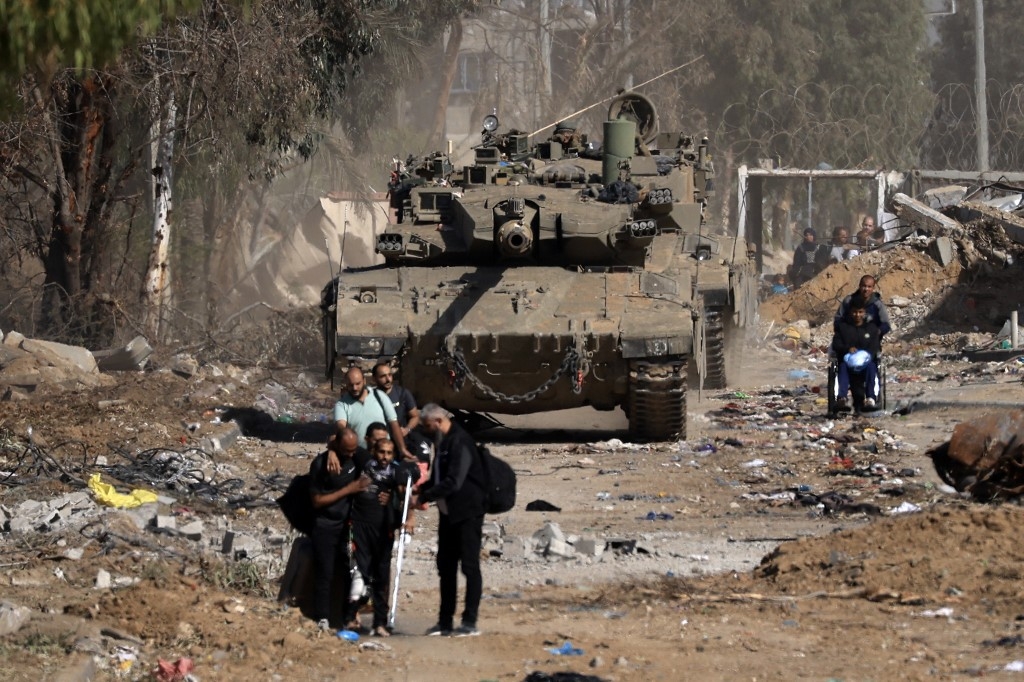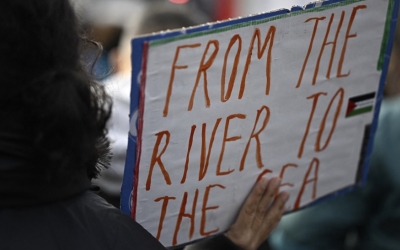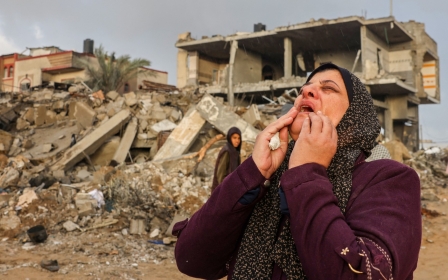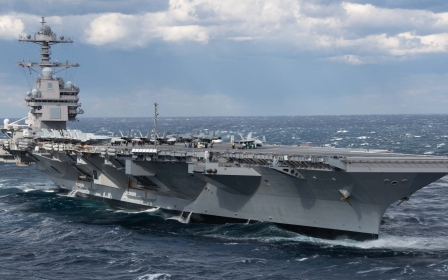Israel-Palestine war: Why the West can’t conceive of a Palestinian right to security

The current political discourse on Palestine/Israel has coalesced around two main frameworks: the first related to humanitarian assistance; and the second, to security.
As we vacillate between the two, we should ask ourselves: who, in this discourse, is worthy of humanitarian assistance? And who is worthy of security?
Given the level of violence, the humanitarian framework has become dominant. Since 7 October, Israel has killed more than 15,000 Palestinians, wounded over 56,000 and internally displaced over 1.6 million. It has done so while raining 24,000 kilotons of explosives on the Gaza Strip - two times the explosive charge of the bomb dropped on Hiroshima.
The humanitarian framework also includes Israeli victims. Hamas has killed 1,200 Israelis (including 346 soldiers), wounded 5,000 and taken 224 hostages, some of whom have now been released. In Israel, such numbers have not been seen since the Yom Kippur War in 1973 - and were inconceivable on 6 October.
Besides humanitarianism, the other dominant framework is security. This, too, is on everybody’s lips, from journalists to pundits and especially world leaders. When it comes to security, however, the discourse prioritises one thing: Israel’s security.
Only Israel, we are told, has the right to defend itself, and western states must do everything to preserve Israel’s security. This requires arming an already militaristic society to the teeth, providing diplomatic cover for its occupation and aggressions, and offering it unconditional political and moral support.
At a moment when Palestinians are massacred by the thousands why can’t anyone conceive of a Palestinian right to security?
One wonders, why do we exclude Palestinians when we think about security? At a moment when Palestinians are massacred by the thousands - in what many are calling a genocide - why can’t anyone conceive of a Palestinian right to security? Why are they solely concerned with humanitarian assistance, corridors, aid, ceasefires, or pauses?
Palestinians seem to matter (if they matter at all) only when they are killed, maimed, wounded, widowed, orphaned, starved and imprisoned.
This is not the case for Israelis, who have a right to be secure. This hypocrisy is very telling of the double standards that have become a cornerstone of our international society, where some are worthy of security, but others are not.
Follow Middle East Eye's live coverage for all the latest on the Israel-Palestine war
The exclusive focus on Israel's security is not recent, and it is not limited to its numerous wars on the Palestinians. In fact, it was central to the peace agreement it signed with the PLO.
The 1993 Declaration of Principles stressed the “mutual dignity and security” of Israelis and Palestinians. Its rationale, however, was Israeli security.
As the Israeli Ministry of Foreign Affairs explicitly put it on its website, the aim was to protect “Israel's vital interests, and in particular its security interests, both with regard to external security as well as the personal security of its citizens in the West Bank”.
By external security, Israel meant its de facto borders with Arab states and the border areas of a future Palestinian state with Jordan and Egypt. By personal security, it referred to its citizens inside the Green Line, but most importantly, to all its settlers in the West Bank and, at the time, Gaza.
Unconditional security for Israel
Israel could justify anything in the name of both: expanding illegal settlements, building new ones, annexing Palestinian land, postponing negotiations, setting up checkpoints, and launching incursions into Palestinian autonomous areas at will.
In the context of the Oslo Accords, Palestinian security was reduced to “internal security”. This meant that Palestinians could police themselves if, and only if, they also protected Israelis from Palestinian groups opposed to the peace process, such as Hamas.
As the British journalist Graham Usher observed at the time, this definition of peace “translates as unconditional security for the Israelis and conditional security for the Palestinians”. In peace, as in war then, Israel’s security was the main priority.
The idea that Palestinians have a right to security - security from Israeli settlers, from Israeli colonisation, and Israeli attacks - is nowhere to be found in the accords.
This is because it was nowhere to be found in the mindset of western states that supported these accords then, and that support Israel’s war now.
In this mindset, only Israel is worthy of security, and Palestinian security, if it is conceivable, is subservient to Israel’s. And when Israel’s security is threatened the way it was on 7 October, the most Palestinians can ask for is humanitarian ceasefires, corridors and aid.
While acknowledging the urgent need for humanitarian support, we must also acknowledge how detrimental this assistance is absent a Palestinian right to security.
At the end of the day, the solution is not humanitarian, nor is it violence. It is only a political solution that takes seriously the right to security for Arabs and Jews alike, rather than an apartheid system that prioritises one over the other.
The views expressed in this article belong to the author and do not necessarily reflect the editorial policy of Middle East Eye.
Middle East Eye propose une couverture et une analyse indépendantes et incomparables du Moyen-Orient, de l’Afrique du Nord et d’autres régions du monde. Pour en savoir plus sur la reprise de ce contenu et les frais qui s’appliquent, veuillez remplir ce formulaire [en anglais]. Pour en savoir plus sur MEE, cliquez ici [en anglais].






